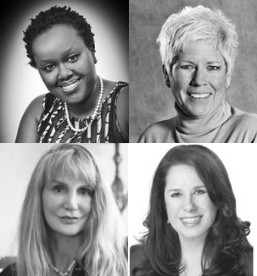“I realized immediately what a big mistake I had made,” she said. She had automatically put herself in a position that reinforced traditional gender and age roles, even as she was working to position herself as an equal. “But I just gave up and decided to go all in.”
She was saved, she said, when her very astute CEO stepped up and “said very clearly, ‘Thank you, Tracy, but I will get my own.’ And then he made a point of walking across the room to the drink area.’”
“It might seem like a little thing,” she said, “but it was a huge statement that he made as the CEO. I was so grateful he had awareness to do that.”
For much of their careers, the early female tech pioneers say, “giving up and going all in” was just what they did on a regular basis.
But with awareness and the right mentors, they said, women can overcome the hurdles and continue paving the way for progress and more gender equality.
Like Parker, Susan Estrada, who in 1988 founded CERFnet, one of the original regional IP networks, credits an astute male boss for helping her move past the frustrations of dealing with colleagues who “were shocked that a woman could do the work.”
Still, she says, the single biggest challenge she faced in her career “was not being male.”
“Low profile was a goal because I didn’t want the professors to think that my femaleness meant I couldn’t do the work,” she said.
And all of that had to be navigated along with the more traditional gender challenge of balancing work and family.

Dorcas Muthoni, CEO and founder of Openworld, which created some of the most widely used Web and cloud applications in Africa, says her biggest career challenge came after getting married and having two daughters eighteen months apart.
“I had just begun changing the business model of my company from consulting to SaaS when love happened and family started,” she said. “I was not prepared for all the unknowns. It took a couple of years to begin getting a working rhythm across all these life-work balances until I learned about life-work integration.
“I must say it’s a long journey that requires a dynamic approach. The primary way I have overcome this is learning to call for help and accept when it is offered.”
Powering through the challenges, the women said, did lead to some rewarding victories.
Yvonne Marie Andres, who created the nonprofit Global SchoolNet, said she had a hard time being taken seriously in the male-dominated IT universe when she was setting up her groundbreaking program to use the Internet to connect schools for collaborative projects. Her background was in education rather than technology.
“When they visited my state-of-the-art, T1-connected Global Schoolhouse middle school classroom, they were in awe and would direct their technical questions to my male assistant, who knew nothing about the Internet,” she said.
“I would answer their question and they would avert their eyes from me and ask him another question. As it turns out, what I did not know about IT actually worked to my advantage, because I found myself demanding the technology accomplish user-friendly tasks that the engineers had not even considered possible.”
To survive in the still largely male tech world, the women all emphasized the importance of women supporting women.
“Susan and Tracy were significant mentors for me in the early days,” Andres said. “I knew that I wanted to be a member of their ‘we can make this happen’ club.”